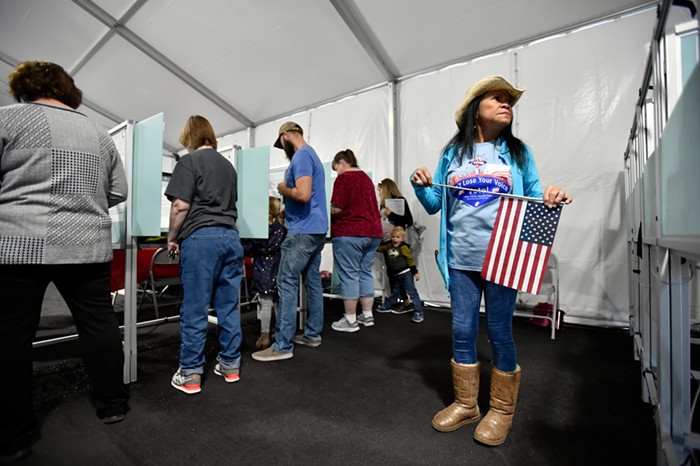
You'd think after nearly 250 years we'd have this voting thing down by now, yet all across the country Americans are once again marking Election Day by waiting in long-ass lines. (Except, that is, for the three enlightened states that have adopted vote-by-mail, which, coincidentally, were also the first three states to legalize weed.)
Voter participation is expected to be record high this week, but voting rates in the U.S. are still abysmally low compared to many countries. Australia, where voting is mandatory, ranks at the top of the heap, followed by Malta, Chile, Belgium, Italy, and Luxembourg, all of which have a voter turnout of over 90 percent. On the lower end, you have Russia, Switzerland, Pakistan, and the United States, where, on a good year, only around 60 percent of eligible voters show up. Why doesn’t nearly half the popular vote? I suspect it's because most people just don't give a shit and their stories are on. If you asked this apathetic portion of the populace who the Attorney General is, I’m guessing they'd say, "What army?" But there's also a population of people who do give a fuck but who still opt not to participate in this particular part of the civic process: conscientious non-voters.
For some conscientious non-voters, it all comes down to who's running. A 53-year-old home-builder who is primarily concerned about government spending (and who benefits from it) told me that he will "vote again when we have a viable third party that values freedom for all, not just the ones whose ideas they favor but especially for those who have ideas they despise." He will not, he added, "vote again until I see politicians that understand and prioritize spending within our means."
I also spoke with a 28-year-old conservative who told me that he was so disappointed in Obama's victories in 2008 and 2012 that the prospect of getting invested and losing again just isn't worth it. Another non-voter, an anarchist and philosophy PhD student, said that voting is damaging because it allows people to "focus on policy and what people in power do instead of what they can do themselves." When I asked what the public should do about policies they disagree with—for example, separating and imprisoning immigrant families—he advocated for direct action like assisting immigrants at border crossings instead. "Voting does matter in the aggregate," he said, "but it doesn't matter if you are talking about the individual.”
This point—that individual votes don't matter—is also made by Katherine Mangu-Ward, the editor-in-chief of Reason, the libertarian magazine based in Washington, D.C. For her, it all comes down to numbers. "You are very, very, very, very, very, very unlikely to be a decisive vote," Katherine said. "Your vote turning the outcome of an election is vanishingly rare, whereas, there are all kinds of things you can do with the hour or two hours of your time that it takes you to vote that are objectively, clearly good."
When I asked Katherine if voting took less time—if she could, say, vote-by-mail, which takes about as much time as walking to your mailbox—she would still feel it’s a waste of time, she said that there are other, more affirmative arguments against voting. "If you think the system is basically corrupt or broken, I think there's a very strong case to make that you actually have a duty not to vote."
On that, we disagree. Democracy isn't inherently corrupt. It's corrupt when the people running it are corrupt, and one of the only means of swaying who is steering the ship is to show up and vote. Sure, your individual vote might not change the outcome of an election, but as Kant would argue, if everyone failed to vote, the system itself would fail. For some non-voters (for instance, the anarchist philosophy student), that may be the goal, but Katherine says she's not in favor of the collapse of the system as we know it. Rather, she prefers to participate in the system in other ways, including calling her elected representatives.
Still, I'm not convinced. Sure, calling your representative is one way to be heard, but if your representative is, say, a rabid, God-fearing, conservative who thinks non-Christians should burn on Earth and will burn in hell, he's probably not going to listen when you call up and demand he vote in favor of access to abortion. Same if you're represented by a member of the DSA and you've got a complaint about tax rates on the rich. So what can you, as an individual, actually do? Show up to vote. Your particular vote might not change the election, but the collective vote does, and the collective is just a bunch of individuals taking action.
Now, I understand why people don't trust the system. Just look at recent history, namely the 2000 and 2016 presidential elections, both of which were ultimately won by the person who got fewer votes. But the only way to correct the system is to elect candidates who will at least try and fix it—and right now, there's only one party in the running that is even remotely interested in that. The other side is busy starting trade wars and locking up children. When the stakes are this high, when the chance to curb Donald Trump comes down to our ballots, I don’t see how not voting can be morally justified—unless, that is, you vote Republican. In that case: Listen to Katherine.



















